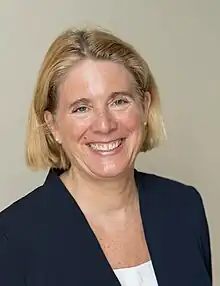Jacqueline Hewitt | |
|---|---|
 | |
| Born | September 4, 1958 Washington, D.C. |
| Alma mater | Bryn Mawr College Massachusetts Institute of Technology |
| Awards | Annie Jump Cannon Award in Astronomy |
| Scientific career | |
| Fields | Astrophysics |
| Thesis | A search for gravitational lensing (1986) |
| Doctoral students | Christopher Williams |
Jacqueline Nina Hewitt (born September 4, 1958) is an American astrophysicist. She was the first person to discover an Einstein ring. She is a Fellow of the American Astronomical Society.
Early life and education
Hewitt was born in Washington, D.C., on September 4, 1958, to parents Warren E. Hewitt, a retired international lawyer from the State Department, and Gertrud (Graedel) Hewitt. She attended Bryn Mawr College where she graduated magna cum laude with a degree in economics in 1980.[1] Hewitt took an astronomy class at Haverford College her sophomore year, which sparked her interest in science. She attended the Massachusetts Institute of Technology for graduate school. During her graduate studies, she began studying gravitational lensing using the Very Large Array radio telescope. Hewitt obtained a Ph.D. in physics in 1986.[2] Some sources erroneously state that she received her Ph.D. in 1988.[3][4]
Career
Hewitt was appointed with a postdoctoral fellowship at MIT as part of the Very-long-baseline interferometry unit from 1986 to 1988. While analyzing the data from her graduate studies, she found a ring on her computer screen. This ring, part of the gravitational lens system MG1131+0456, ended up being the very first Einstein ring discovered. Since Hewitt's groundbreaking discovery, many other Einstein rings have been discovered, and were found to be far more common than astronomers thought. Einstein rings are important because they can help answer questions about the size and the fate of our universe. Hewitt worked as a researcher at Princeton University's Department of Astrophysical Sciences in 1988. After one year of researching at Princeton, she returned to MIT as an assistant physics professor, working as a full-time professor since 1989. Hewitt is also the principal investigator for the Radio Astronomy Group of the Research Laboratory of Electronics at MIT.[3][4] Since 2002, Hewitt has been appointed Director of the MIT Kavli Institute for Astrophysics and Space Research.[5]
Honors
In 1990, Hewitt won the David and Lucile Packard Foundation fellowship. For her work on gravitational lenses, her colleagues at MIT nominated her for the 1995–1996 Harold E. Edgerton Award. In 1995, Hewitt was the recipient of the Maria Goeppert-Mayer Award[3][4] and in 1989 the Annie J. Cannon Award in Astronomy for her work in radio astronomy.
She was elected a Legacy Fellow of the American Astronomical Society in 2020.[6]
Personal life
Hewitt has two children: Keith Hewitt Redwine, born in 1988, and Jonathan Hewitt Redwine, born in 1993.[3][4]
References
- ↑ "Hewitt takes the controls at Center for Space Research". MIT News. Retrieved 2019-03-16.
- ↑ Hewitt, Jacqueline. "Jacqueline Hewitt". MIT. Retrieved 15 March 2014.
- 1 2 3 4 Oakes, Elizabeth H. (2002). International encyclopedia of women scientists. New York, NY: Facts on File. ISBN 0-8160-4381-7.
- 1 2 3 4 Proffitt, Pamela (1999). Notable women scientists. Detroit [u.a.]: Gale Group. ISBN 0-7876-3900-1.
- ↑ "MIT Kavli Institute Directory | MIT Kavli Institute for Astrophysics and Space Research". space.mit.edu. Retrieved 2016-06-15.
- ↑ "AAS Fellows". AAS. Retrieved 29 September 2020.